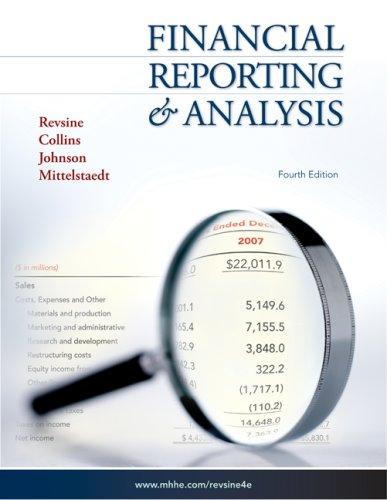The following excerpt is from an article that appeared in The Wall Street Journal. Nike Inc. warned
Question:
The following excerpt is from an article that appeared in The Wall Street Journal.
Nike Inc. warned that shifts in order patterns and other factors
would drag fiscal fourth-quarter earnings below Wall Street forecasts.
The news hammered the Beaverton, Ore., athletic-footwear
maker's highflying shares. In New York Stock Exchange composite
trading yesterday, Nike dropped \($8.625,\) or 13%, to \($55.375\).
The issues crimping profits for the period ending tomorrow
are relatively minor and short term, analysts said. But Wall
Street and investor expectations about Nike have been high because
of the company’s turbocharged growth over the past several
quarters. Moreover, the stock has surged in recent days on
unconfirmed rumors that investor Warren Buffett has been
buying Nike shares. The developments do represent the first
stumble in a long time for Nike, which has had profit increases
as high as 80% in recent quarters.
Nike said that it expects earnings of between 51 and 56 cents
a share for the fourth quarter, including a one-time pretax
charge of \($18\) million for the planned shutdown of a manufacturing
facility. Wall Street had been expecting earnings of
69 cents a share. In the year-earlier fourth quarter, Nike earned
\($156.4\) million, or 53 cents a share, on revenue of \($1.92\) billion.
Nike said several factors damped fourth-quarter profits.
One was a shift in order patterns, particularly in Europe. Nike said more retailers bought more items in advance. Typically, Nike retailers buy shoes in advance, and if they sell out, make emergency “at once” orders that are delivered quickly. But Nike said retailers are making fewer “at once” orders in the current quarter. That implies that retailers’ sales are lower than they expected. Some analysts said that, because of Nike’s torrid growth in recent quarters, Nike retailers ordered aggressively, betting that sales would continue to surge. “Some got stuck because sales may not have gone up as rapidly as they have,” said Jennifer Black Groves, an analyst with Black & Co.
Nike also said it had a “slight” increase in order cancellations in the U.S. Nike's international business has been booming, but US. sales still make up more than 60% of total revenue. In an analysts call, the company said it had about \($30\) million of canceled orders in the quarter, slightly more than it has typically had in recent quarters. Analysts said the domestic market for Nike is mature, and suggested Nike may have priced shoes at a point where competitors can cut into Nike sales. Reebok, Converse, and Adidas all have recently introduced shoes that sell in the \($80\) to \($110\) a pair range; many Nike models cost more. “They've been walking up the price ladder and they may have gone up as far as they can go,’ said Alice Ruth, an analyst at Montgomery Securities.
Even with pinched fourth-quarter profit, Nike said it expects a record year, with revenue and profit increasing 40% from year earlier levies. It also said it expects revenue growth in 1998 to surpass the company’s stated goal of 15%. Last fiscal year, Nike earned \($553.2\) million, or \($3.77\) a share, on sales of \($6.5\) billion.
Nonetheless, the fourth-quarter projection prompted many analysts to adjust their fiscal 1997 and 1998 projections. Shelly Hale Young, analyst at Hambrecht & Quist, lowered her 1997 projection to \($2.68\) a share from \($2.83\), and dropped her 1998 forecast to \($3.24\) from \($3.40.
Required:
1.\) What aspects of The Wall Street Journal article are likely to have caused Nike's stock price to change?
2. Assume that you are a financial analyst. Would the information in the article cause you to alter your forecast of Nike’s earnings for next year (1998)? Why? Would the article alter your earnings forecasts for each of the next five years? Why?
3. Do you think that the stock prices of Nike’s competitors (Reebok, Converse, L.A. Gear, and Adidas) would change on the day that Nike made the announcement? If so, how and why? If not, why not?
4. Firms often release important news after the market has closed for the day. Why might they do this? What are the costs and benefits of such a strategy?
Step by Step Answer:






